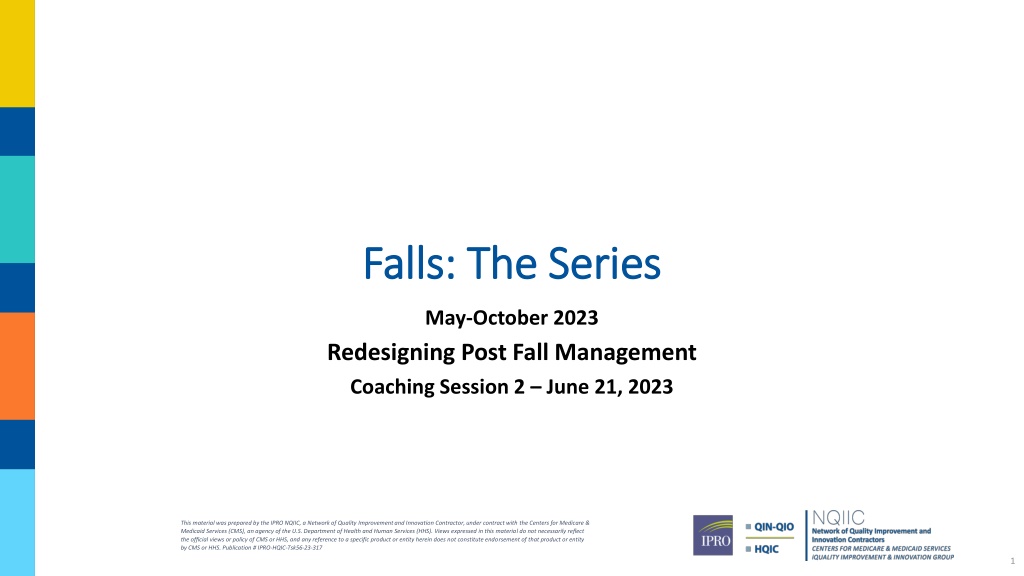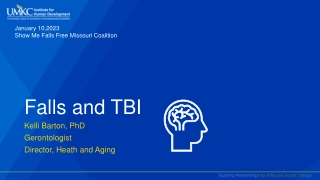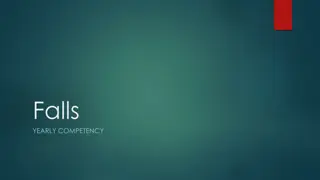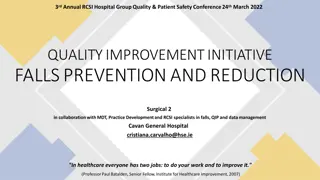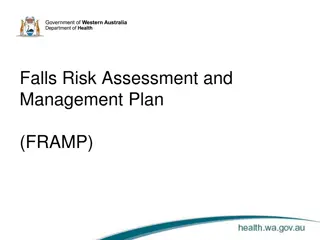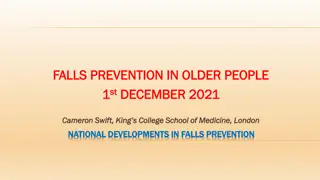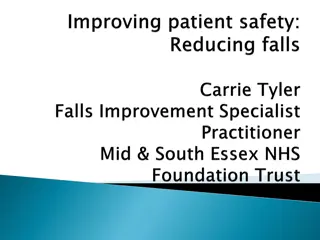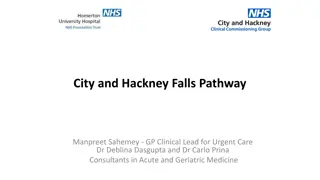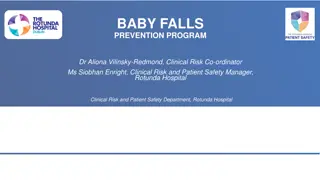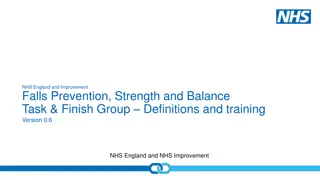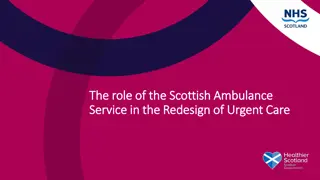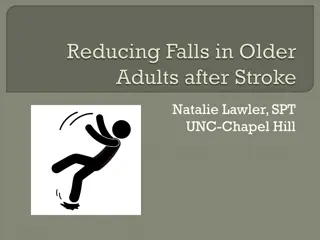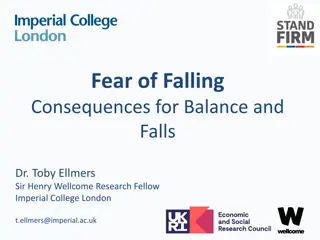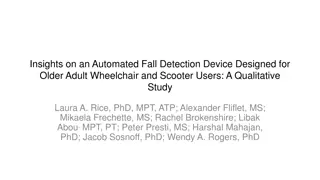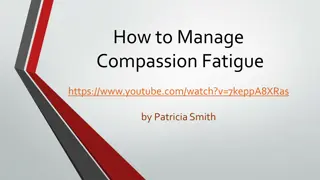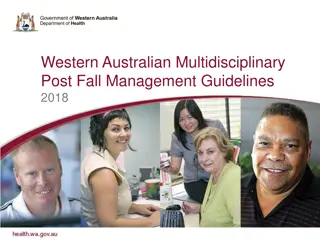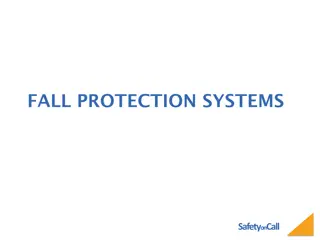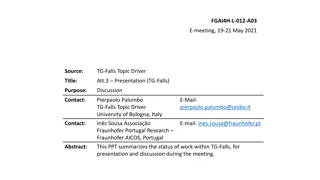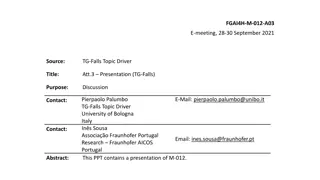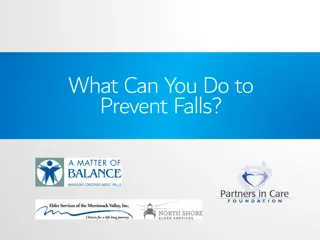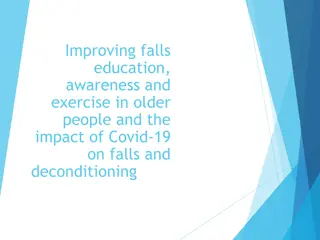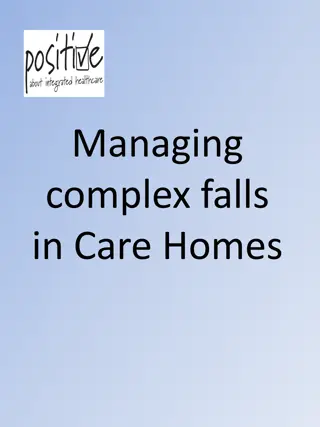Falls: The Series - Redesigning Fall Management with Patricia A. Quigley
Falls: The Series offers a comprehensive program focusing on fall prevention and injury reduction. Join the coaching sessions led by expert speaker Patricia A. Quigley to enhance program infrastructure, redesign fall management, and access online learning opportunities. This initiative aims to improve healthcare systems and promote patient safety through innovative practices.
Download Presentation

Please find below an Image/Link to download the presentation.
The content on the website is provided AS IS for your information and personal use only. It may not be sold, licensed, or shared on other websites without obtaining consent from the author. Download presentation by click this link. If you encounter any issues during the download, it is possible that the publisher has removed the file from their server.
E N D
Presentation Transcript
Falls: The Series Falls: The Series May-October 2023 Redesigning Post Fall Management Coaching Session 2 June 21, 2023 This material was prepared by the IPRO NQIIC, a Network of Quality Improvement and Innovation Contractor, under contract with the Centers for Medicare & Medicaid Services (CMS), an agency of the U.S. Department of Health and Human Services (HHS). Views expressed in this material do not necessarily reflect the official views or policy of CMS or HHS, and any reference to a specific product or entity herein does not constitute endorsement of that product or entity by CMS or HHS. Publication # IPRO-HQIC-Tsk56-23-317 1
The IPRO QIN The IPRO QIN- -QIO QIO The IPRO QIN-QIO A federally-funded Medicare Quality Innovation Network Quality Improvement Organization (QIN-QIO) 12 regional CMS QIN-QIOs nationally IPRO: New York, New Jersey, and Ohio Healthcentric Advisors: Connecticut, Maine, Massachusetts, New Hampshire, Rhode Island, and Vermont Qlarant: Maryland, Delaware, and the District of Columbia Working to ensure high-quality, safe healthcare for 20% of the nation s Medicare FFS beneficiaries
Series Schedule: 2 Series Schedule: 2- -3p.m. EST 3p.m. EST Date Session #/Topic 1. Enhancing Capacity Reengineering Fall and Fall Injury Programs: Infrastructure, Capacity and Sustainability Wednesday, May 3 2. Redesigning Post-Fall Management: Prevent Repeat Falls Wednesday, June 7 3. Best Practices to Reduce Falls Associated with Toileting Wednesday, July 5 4. Safe Mobility is Fall Prevention Wednesday, August 2 5. Population-Specific Fall and Injury Prevention Wednesday, September 6 6. Reducing Fall-Related Injuries: Protective Interventions Evidence, Application and Success Wednesday, October 4 3
Your Participation Will: Support organizational systems and teams to expand program infrastructure and capacity; Help you redesign your fall prevention and injury reduction program; Complement your evaluation program; and Provide access to an online learning community to increase exchange of experiences, innovations, and best practice implementations. 4
Series Speaker Series Speaker Patricia A. Quigley, PhD, APRN, CRRN, FAAN, FAANP, FARN Nurse Consultant Dr. Quigley is the President and Managing Member of Patricia A. Quigley, Nurse Consultant, LLC, which provides consultation to healthcare systems and patient safety organizations to advance patient safety programs and re-engineer integration of innovation at the point of care. For more than 45 years, Dr. Quigley has practiced in the field of rehabilitation nursing. She is recognized for her leadership as a speaker, scholar, researcher, author, educator, and mentor. Dr. Quigley s contributions to patient safety, nursing, and rehabilitation are highly respected both nationally and internationally. She is known for her emphasis on clinical practice innovations designed to promote independence and safety for the elderly. Dr. Quigley is currently a member of the National Quality Forum s Prevention and Population Health Committee. 5
IPRO Coaching Webinars Pat Quigley, PhD, MPH, APRN, CRRN, FAAN, FAANP, FARN Nurse Consultant E-Mail: pquigley1@tampabay.rr.com
Open Forum/Coaching Webinar Series Objectives Provide an open forum for sharing, collaboration, and support. Compose strategies to reduce barriers and enhance facilitators to short-term and long- term program implementation. Address additional areas of fall program management as a community of learning. 7
Our Webinar Schedule Webinar 1: May 3, Enhancing Capacity: Reengineering Fall and Fall Injury Programs: Infrastructure, Capacity and Sustainability, Coaching Session: May 17, Open Forum, Discussion Webinar 2: June 7, Redesigning Post Fall Management Coaching Session: June 21, Open Forum, Discussion Webinar 3: July 5, Best Practices to Reduce Falls Associated with Toileting Coaching Session: July 19, Open Forum, Discussion
Our Webinar Schedule (cont.) Webinar 4: Aug. 2, Safe Mobility is Fall Prevention Coaching Session: Aug. 16, Open Forum, Discussion Webinar 5: Sept. 6, Population-Specific Fall and Fall-injury Prevention Coaching Session: Sept, 20, Open Forum, Discussion Webinar 6: Oct. 4, Reducing Fall-related Injuries: Protective Interventions, Evidence and Application Closing Coaching Session: Oct. 18, Open Forum, Discussion Thank you!
A Refresher: Post Fall Management Patricia A. Quigley, PhD, MPH, APRN, CRRN, FAAN, FAANP, FARN, Nurse Consultant June 21, 2022 e-mail: pquigley1@tampabay.rr.com
Objectives Examine post fall practices as key intervention to reduce repeat falls Differentiate: Post Fall Huddles Post Fall Management Post Fall Documentation Incident Report
Burden Falls affect between 700,000 - 1,000,000 patients each year (AHRQ, Patient Safety Network [PSNet], Patient Safety Primer: Falls. Updated Sept. 2019) Fall Rates: 3-5/1000 patient days (AHRQ, PSNet, Sept 2019) More than 1/3 of in-hospital falls result in injury (AHRQ, PSNet, 2019) Ranked among the most reported incidents in hospitals and other facilities (AHRQ, PSNet, Sept 2019) Falls can lead to severe injuries, hip fractures, and head trauma
Post Fall Practices Post Fall Huddle Post Fall Assessment Patient/Resident/Family Education Staff Education
Safety Huddles Pre-Shift Huddles Post-Fall Huddles Conducted with the patient/resident where the fall occurred within 15 minutes of the fall Post Fall Analysis What was different this time? When? How? Why? Prevention: Protective Action Steps to Redesign the Plan of Care
Post Fall Huddle (PFH): Essential Components A brief staff gathering, interdisciplinary when possible, that immediately follows a fall event Convenes within 15 minutes of the fall event Clinician(s) responsible for patient/resident during fall event leads the PFH Involves the patient/resident whenever possible in the environment where the patient/resident fell Requires Group Think to discovery what happened Utilizes discovery to determine the root cause/immediate cause of the fall: why the patient/resident fell Guiding question to ask: What was different this time you were doing this activity, compared to all the other times you performed the same activity (and did not fall)?
Steps to the Post Fall Huddle 1. TL makes announcement 2. Convene within 15 minutes with the patient/resident in the environment where the patient/resident fell 3. Conduct Analysis: determine root cause of fall, injury and Type of Fall 4. TL summarizes information gleaned from PFH and intervention(s) for prevention of repeat falls are decided by the huddle team 5. TL completes of the Post-Fall Huddle Form and processes the form according to medical center policy and procedure 6. Modifies the fall prevention plan of care to include interventions to prevent repeat fall 7. Communicate updated plan of care in patient/resident hand-off reports 8. Complete EMR Post-Fall Note
Determine Preventability Step 1: Conduct the Post Fall Huddle. Step 2: Determine the Immediate Cause of the Fall. Step 3: Determine the Type of Fall. Step 4: If Accidental and Anticipated Physiological Falls, determine Preventability: Could the care provider (direct care provider) have anticipated this event with the information available at the time? If the Answer is NO, the fall is not preventable. If the answer is YES, the provider must ask another question: Were appropriate precautions taken to prevent this event? Answer: No, Clearly or likely Preventable; Yes, Clearly or likely Unpreventable Levinson, D. R., (2010, Nov). Adverse events in hospitals: National incidence among Medicare beneficiaries. DHHS. OEI-06-09-00090
Post Fall Huddle Form Don t Morph This Form to Be Something Else
Lets Take a Look My Audit Tool
Outcomes of Post Fall Huddles Specify Root Cause (proximal cause) Specify Type of Fall Identify actions to prevent reoccurrence Changed Planned of Care Patient/Resident (family) involved in learning about the fall occurrence Prevent Repeat Fall Reduce Repeat Fall Rate
Post Fall Huddle Resources VA: Falls Toolkit Post Fall Huddles www.patientsafety.va.gov AHRQ Falls Toolkit 2013
Outcomes of Post Fall Huddles Specify Root Cause (proximal cause) Specify Root Cause of Injury Specify Type of Fall Identify actions to prevent reoccurrence Changed Planned of Care Patient/Resident (family) involved in learning about the fall occurrence Prevent Repeat Fall
Formative Measures Structures: Who attends: Nursing and others Count them Changed Plan of Care: Add actions to your run-chart: Annotated run chart; Capture interventions Processes: Timeliness of Post Fall Huddle (number of minutes) Timeliness of changing plan of care Time to implemented changed plan of care
Summative Outcome Prevent Repeat Fall: Same Root Cause and Same Type of Fall Reduce costs associated with falls and fall related injuries
Post Fall Assessment Different than a Huddle!
Post Fall Assessment In-depth Data Gathering Circumstances of the Fall Patient/Resident Presentation Assessment of Patient/Resident Condition
Comprehensive Post-Fall Assessment Includes: General information about the fall Subjective & objective falls documentation Patient/Resident Assessment vital signs; visible signs of injury (type & pain scores); glucometer (if diabetic or facility policy); Glasgow Scale (if suspected brain injury) and Morse Falls scale Interventions based on Fall Risk Scale/Morse falls scale Facility personnel and family notification
Teaching: After a Fall Reframe patient/resident education curricula to include "what happens after a fall". What can we learn from this event? How can we work together to prevent this again?
Staff Education Universal Fall Prevention Individualized Fall Prevention Injury Reduction Strategies Root Cause Trends of Falls Interventions for Improvement Impact of Changes in Practices
My Unit Story Board Annotated Story Board Fallers 5So Med Surg 0 RC RC RC 1 RC RC 2 CA CA CA CA CA 3 DOI DOI DOI DOI DOI 4 5 DOR DOR 6 Sun Mon Tues Weds Thurs Friday Sat Fall 1
Learn from Falls: Change Your Conversation Talk About and Trend Root Causes Monitor Interventions for Mitigation/Elimination of Root Causes Align Interventions to Type of Falls Precision In Program Evaluation: Reduction Accidental Falls Anticipated Physiological Falls Unanticipated Physiological Falls
What Did You Learn? Compare your PFH Process with what was presented. Compare your Post Fall Management Process with what was presented. Review the PFH Audit Tool for your use.
Your Turn to Share What Steps Have You Taken Since Our Webinar?
Please Share What Questions Do You Have?
Open Forum How Else Can I Help You?
Our Upcoming Webinar Schedule Webinar 3: July 5. Best Practices to reduce Falls Associated with Toileting Coaching Session: July 19, Open Forum, Discussion
Thank you! You Can Always Reach Me! Patricia Quigley, PhD, MPH, ARNP, CRRN, FAAN, FAANP, Nurse Consultant pquigley1@tampabay.rr.com
Next Steps Next Steps Join us for our next Learning call: July 5,2023 2-3p.m. EST Best Practices to Reduce Falls Associated with Toileting https://qi.ipro.org/2023/04/19/fall-and-injury-prevention-a-6-part-webinar-series/ Falls series recording and slides: https://qi.ipro.org/2023/04/19/fall-and-injury-prevention-a-6-part-webinar-series/ 39
Thank You for Attending Todays Event We value your input! Please complete the brief survey after exiting event. 40
IPRO HQIC & Speaker Contact Information IPRO HQIC & Speaker Contact Information Rebecca Van Vorst MSPH CPHQ Senior Director Quality Improvement IPRO HQIC Project Manager rvanvorst@ipro.org Melanie Ronda, MSN, RN Director, Health Care Quality Improvement IPRO QIN-QIO Nursing Home Lead, NY, NJ, Ohio Infection Prevention Specialist mronda@ipro.org CarlaLisa Rovere-Kistner, LCSW, CCM, CPHQ Quality Improvement Specialist IPRO crkistner@ipro.org Amy Stackman, RN Quality Improvement Specialist IPRO QIN-QIO astackman@ipro.org 41
